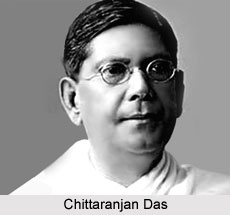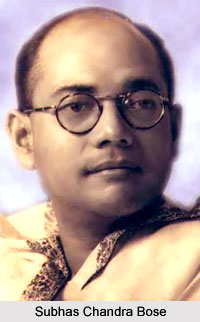 Bengal Provincial Congress Committee was the Bengal branch of the Indian National Congress. The Bengal Provincial Congress (BPC) was founded in the year 1920. Chittaranjan Das acted as the initial leader of the committee. Later in 1923, he established the Swaraj Party despite remaining in the Indian National Congress. This was done due to the No Entry policy of Mahatma Gandhi into the elected councils under the Government of India Act, 1919. After his death in 1926, the Bengal Provincial Congress Committee was later divided into parts that were led by Subhas Chandra Bose and Jatindra Mohan Sengupta. Bose intended to continue in the path of Chittaranjan Das for the accommodation of Hindus and Muslims in the political management of the Committee and in such local self-governing associations, such as the Calcutta Municipal Corporation. Where as Jatindra Mohan Sengupta represented the interests of the high caste Hindus.
Bengal Provincial Congress Committee was the Bengal branch of the Indian National Congress. The Bengal Provincial Congress (BPC) was founded in the year 1920. Chittaranjan Das acted as the initial leader of the committee. Later in 1923, he established the Swaraj Party despite remaining in the Indian National Congress. This was done due to the No Entry policy of Mahatma Gandhi into the elected councils under the Government of India Act, 1919. After his death in 1926, the Bengal Provincial Congress Committee was later divided into parts that were led by Subhas Chandra Bose and Jatindra Mohan Sengupta. Bose intended to continue in the path of Chittaranjan Das for the accommodation of Hindus and Muslims in the political management of the Committee and in such local self-governing associations, such as the Calcutta Municipal Corporation. Where as Jatindra Mohan Sengupta represented the interests of the high caste Hindus.
Jatindra Mohan Sengupta received the support of Mahatma Gandhi and became President of the Bengal Provincial Congress. During this period, two anti-British revolutionary organizations emerged in Bengal, namely Anushilan Samiti and Jugantar. These 2 revolutionary groups supported Subhas Chandra Bose until 1928. Later Jugantar continued to support Bose, where as the Anushilan Samiti supported Jatindra Mohan Sengupta. Other than these 2 sections, there were a several other groups in the Bengal Provincial Congress Committee, especially the Muslims and the communists. Some of the prominent members of the committee included Benoy Chowdhury, Bijay Modak and Bankim Mukherjee. Netaji Subhas Chandra Bose organised a democratic front within the Bengal Provincial Congress which intensified the conflict between the 2 sections of the Committee.
 After Bose was detained during the 1930s, the control over the committee was passed into the hands of Dr. Bidhan Chandra Roy, Tulsi Charan Goswami, Nalini Ranjan Sarkar, Nirmal Chandra Chander and Sarat Chandra Bose, who was the elder brother of Subhas Chandra Bose. The leadership of the Bengal Provincial Congress invited the discontentment of the central leadership of the Indian National Congress Party on the issue of Muslim representation in the Calcutta Municipal Corporation. In the year 1930, when the Civil Disobedience Movement was initiated, the Bengal Provincial Congress Committee was no more a united political platform.
After Bose was detained during the 1930s, the control over the committee was passed into the hands of Dr. Bidhan Chandra Roy, Tulsi Charan Goswami, Nalini Ranjan Sarkar, Nirmal Chandra Chander and Sarat Chandra Bose, who was the elder brother of Subhas Chandra Bose. The leadership of the Bengal Provincial Congress invited the discontentment of the central leadership of the Indian National Congress Party on the issue of Muslim representation in the Calcutta Municipal Corporation. In the year 1930, when the Civil Disobedience Movement was initiated, the Bengal Provincial Congress Committee was no more a united political platform.
Factionalism continued in the committee when Subhas Chandra Bose resigned from his Presidentship of the Indian National Congress during the repercussion of the Tripura session in 1939. This resulted from the because of the non-cooperation and insistent opposition of Mahatma Gandhi and his rightist supporters. He resumed his Presidentship of the Bengal Provincial Congress Committee and conflicted conflict with the working committee of the Indian National Congress. Bose was eventually suspended for 3 years and barred from holding any elective position within the Congress.
The committee functioned under the leadership of Subhas Chandra Bose as a suspended branch and a parallel association of the official committee under the presidentship of Surendra Mohan Ghosh. Later the Bengal Provincial Congress Committee came under the authority of supporters of Gandhi, namely Dr. Prafulla Chandra Ghosh, Surendra Mohan Ghosh and others. The parallel committee, which was led by Afsaruddin Ahmed Chaudhury, Rajendranath Deb, Jyotish Chandra Ghosh, Khagendra Nath Dasgupta and others continued upto 1942.
Later during the year 1942 to 1945, both the suspended and official committees of Bengal Provincial Congress dissolved. After World War II, Sarat Chandra Bose established a single and united Bengal Provincial Congress Committee that would efficiently contest the elections to the provincial and central legislatures during late 1945 and early 1946. The new committee included Surendra Mohan Ghosh, Dr. Prafulla Chandra Ghosh, Afsaruddin Ahmed Chaudhury, Hemanta Kumar Basu and Sarat Chandra Bose.
Dr. Prafulla Chandra Ghosh, whoc was the only working committee member from Bengal at that period, became the elected leader of the Congress Parliamentary Party and the first Chief Minister of West Bengal in the year 1947.



















